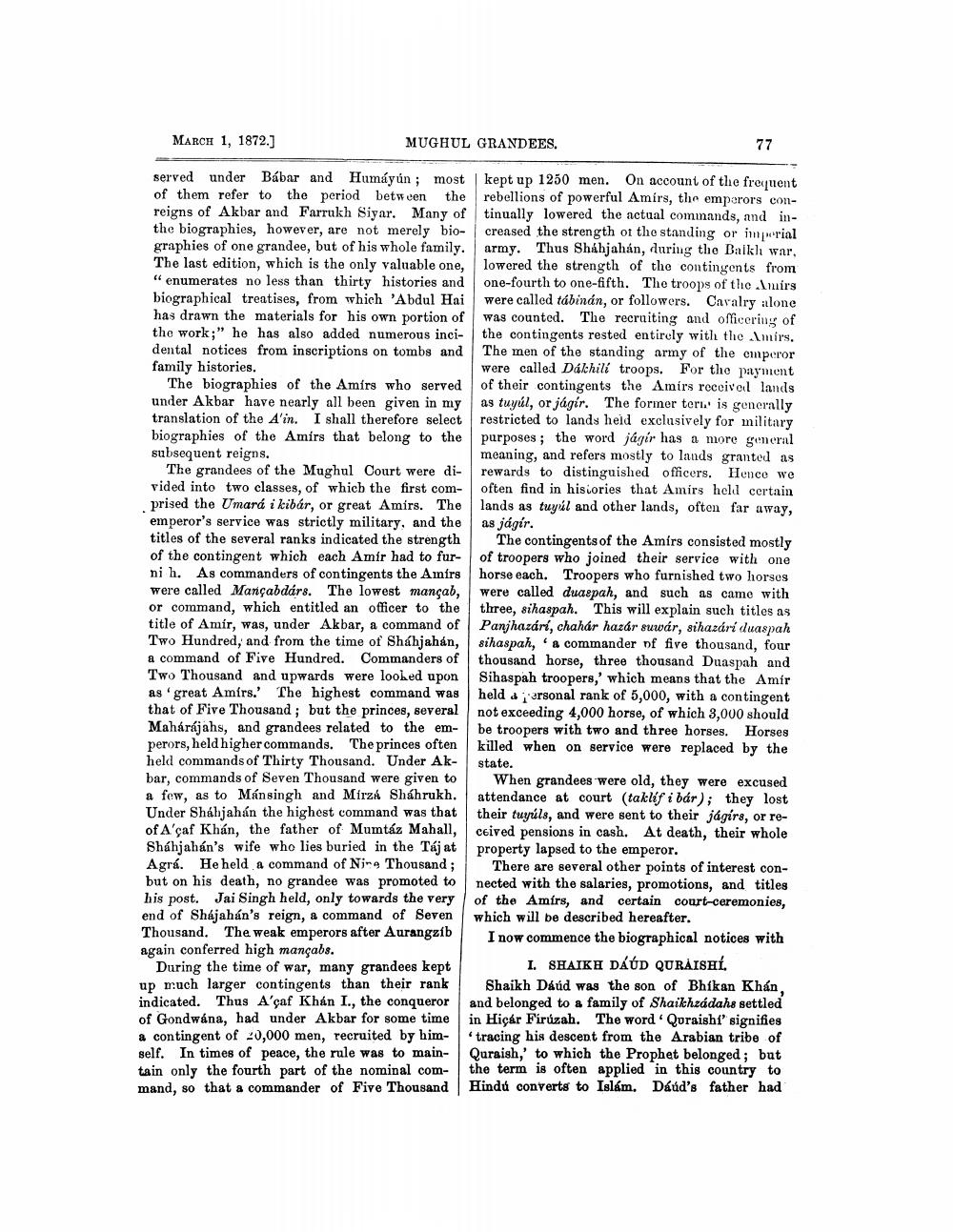________________
MARCH 1, 1872.]
MUGHUL GRANDEES.
served under Bábar and Humáyun; most kept up 1250 men. On account of the frequent of them refer to the period between the rebellions of powerful Amirs, the emperors conreigns of Akbar and Farrukh Siyar. Many of tinually lowered the actual commands, and inthe biographies, however, are not merely bio- creased the strength of the standing or imperial rranhies of one grandee. but of his whole family. I army. Thus Shahjahan, during the Balkl war. The last edition, which is the only valuable one, lowered the strength of the contingents from “ enumerates no less than thirty histories and one-fourth to one-fifth. The troops of the Imirs biographical treatises, from which 'Abdul Hai were called tábinán, or followers. Cavalry alone has drawn the materials for his own portion of was counted. The recruiting and officering of the work;" he has also added numerous inci- the contingents rested entirely with the Amirs. dental notices from inscriptions on tombs and The men of the standing army of the emperor family histories.
were called Dálchilí troops. For the payment The biographies of the Amirs who served of their contingents the Amirs receivel lands under Akbar have nearly all been given in my as tuyúl, or jágír. The former ter is generally translation of the A'in. I shall therefore select restricted to lands held exclusively for military biographies of the Amirs that belong to the purposes; the word jágír has a more general subsequent reigns.
meaning, and refers mostly to lands granted as The grandees of the Mughul Court were di- rewards to distinguished officers. Hence wo vided into two classes, of which the first com- often find in histories that Amirs held certain prised the Umará i kibár, or great Amirs. The lands as tuyil and other lands, often far away, emperor's service was strictly military, and the as jágír. titles of the several ranks indicated the strength The contingents of the Amirs consisted mostly of the contingent which each Amir had to fur- of troopers who joined their service with one ni h. As commanders of contingents the Amirs horse each. Troopers who furnished two horses were called Mancabdárs. The lowest mancab, were called duaspah, and such as came with or command, which entitled an officer to the three, sihaspah. This will explain such titles as title of Amír, was, under Akbar, a command of Panjhazárí, chahár hazár suwar, sihazári duaspah Two Hundred, and from the time of Shahjahan, sihaspah, a commander of five thousand, four a command of Five Hundred. Commanders of thousand horse, three thousand Duaspah and Two Thousand and upwards were looked upon Sihaspah troopers,' which means that the Amir as great Amirs. The highest command was held dersonal rank of 5,000, with a contingent that of Five Thousand; but the princes, several not exceeding 4,000 horse, of which 3,000 should Mahárájahs, and grandees related to the em- be troopers with two and three horses, Horses perors, held higher commands. The princes often killed when on service were replaced by the held commands of Thirty Thousand. Under Ak- state. bar, commands of Seven Thousand were given to When grandees were old, they were excused a few, as to Mánsingh and Mirzh Shahrukh. attendance at court (taklif i bár); they lost Under Shahjahán the highest command was that their tuyúls, and were sent to their jágirs, or reof A'raf Khán, the father of Mumtaz Mahall, ceived pensions in cash. At death, their whole Shahjahán's wife who lies buried in the Táj at property lapsed to the emperor. Agrá. He held a command of Nine Thousand; There are several other points of interest conbut on his death, no grandee was promoted to nected with the salaries, promotions, and titles his post. Jai Singh held, only towards the very of the Amirs, and certain court-ceremonie end of Shajahán's reign, a command of Seven which will be described hereafter. Thousand. The weak emperors after Aurangzib
I now commence the biographical notices with again conferred high mancabs. During the time of war, many grandees kept
I. SHAIKH DÁÚD QURAISHÍ. up much larger contingents than their rank Shaikh Daud was the son of Bhikan Khán. indicated. Thus A'çaf Khán I., the conqueror and belonged to a family of Shaikhzadahe settled of Gondwana, had under Akbar for some time in Hiçár Firúzah. The word Quraisht signifies a contingent of 20,000 men, recruited by him- tracing his descent from the Arabian tribe of self. In times of peace, the rule was to main- Quraish,' to which the Prophet belonged; but tain only the fourth part of the nominal com- the term is often applied in this country to mand, so that a commander of Five Thousand Hindu converts to Islám. Daud's father had




